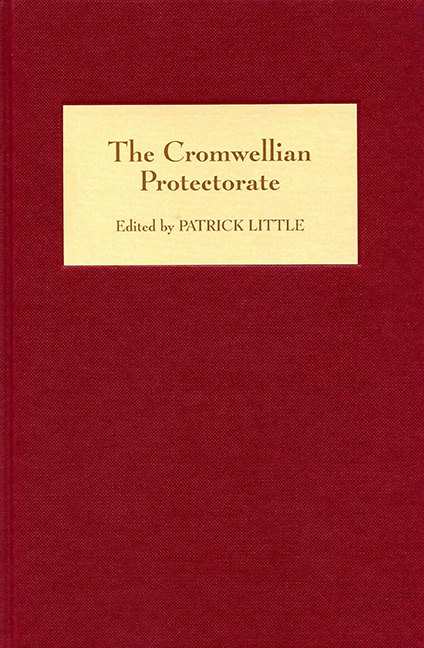Book contents
- Frontmatter
- Contents
- List of Illustrations
- Preface
- Notes on Contributors
- Abbreviations
- 1 Introduction
- 2 Oliver Cromwell and the Protectorate Parliaments
- 3 The Protector Humbled: Richard Cromwell and the Constitution
- 4 Cromwellian Style: The Architectural Trappings of the Protectorate Regime
- 5 Oliver Cromwell and the Council
- 6 ‘To Create a Little World out of Chaos’: The Protectoral Ordinances of 1653–1654 Reconsidered
- 7 The Irish and Scottish Councils and the Dislocation of the Protectoral Union
- 8 ‘This Murmuring and Unthankful Peevish Land’: Wales and the Protectorate
- 9 Cromwellian Towns in the Severn Basin: A Contribution to Cis-Atlantic History?
- 10 Policing the Cromwellian Church: The Activities of the County Ejection Committees, 1654–1659
- Index
3 - The Protector Humbled: Richard Cromwell and the Constitution
Published online by Cambridge University Press: 24 October 2017
- Frontmatter
- Contents
- List of Illustrations
- Preface
- Notes on Contributors
- Abbreviations
- 1 Introduction
- 2 Oliver Cromwell and the Protectorate Parliaments
- 3 The Protector Humbled: Richard Cromwell and the Constitution
- 4 Cromwellian Style: The Architectural Trappings of the Protectorate Regime
- 5 Oliver Cromwell and the Council
- 6 ‘To Create a Little World out of Chaos’: The Protectoral Ordinances of 1653–1654 Reconsidered
- 7 The Irish and Scottish Councils and the Dislocation of the Protectoral Union
- 8 ‘This Murmuring and Unthankful Peevish Land’: Wales and the Protectorate
- 9 Cromwellian Towns in the Severn Basin: A Contribution to Cis-Atlantic History?
- 10 Policing the Cromwellian Church: The Activities of the County Ejection Committees, 1654–1659
- Index
Summary
Through lingering Whig tendencies, or mere laziness, few have questioned the inevitability of Richard Cromwell's fall. The collapse of the protectorate of ‘Tumbledown Dick’ is regarded as having reflected a lack of political and military experience, imperfect judgement, and a misspent youth. The ridiculing began during his reign and has continued almost uninterrupted to the present day. In the late 1650s he was styled the ‘young gentleman’, and the ‘pretended protector’, and the insults became even more prevalent after May 1659, when republicans and royalists alike dubbed him ‘Queen Dick’, the ‘meek knight’, and the ‘milk sop’. However, there has always been an undercurrent of respect for Richard, and some contemporaries recognised the ‘intriguing designs’ of his enemies, the falsity of his friends, and the perfidy of his kinsmen, and that if he lacked a ‘genius’ to rule, then he also had neither ‘friend, nor treasure, nor army to support him’. Oliver Cromwell's failure to tame the army interest ensured that Richard faced challenges to his power which could only have been overcome by a ruthlessness to which he was temperamentally unsuited, and which might have plunged the country into chaos, as even his enemies could concede. Moreover, his detachment from prevailing factions may actually have provided the foundation for a firm following, and the country may ultimately have recognised his appealing traits as a ruler, as enlightenment giants such as Voltaire were later to do.
Richard Cromwell's career, therefore, requires re-appreciation, and it would be possible to re-examine his life before September 1658, his record after nomination as protector, and his career after the dissolution of the 1659 parliament. The contribution which this chapter seeks to make towards Richard's rehabilitation, however, concerns the constitutional constraints placed upon him by the Humble Petition and Advice of May 1657.
Richard Cromwell is the only English head of state to have inherited a written constitution, and it was his misfortune to inherit the Humble Petition and Advice rather than its predecessor, the Instrument of Government (of December 1653). It is rarely appreciated that the Humble Petition was initially designed as a monarchical constitution, intended to back the crowning of Oliver Cromwell, and that it became deeply problematic upon the rejection of kingship, after which it was turned into a protectoral model.
- Type
- Chapter
- Information
- The Cromwellian Protectorate , pp. 32 - 52Publisher: Boydell & BrewerPrint publication year: 2007

